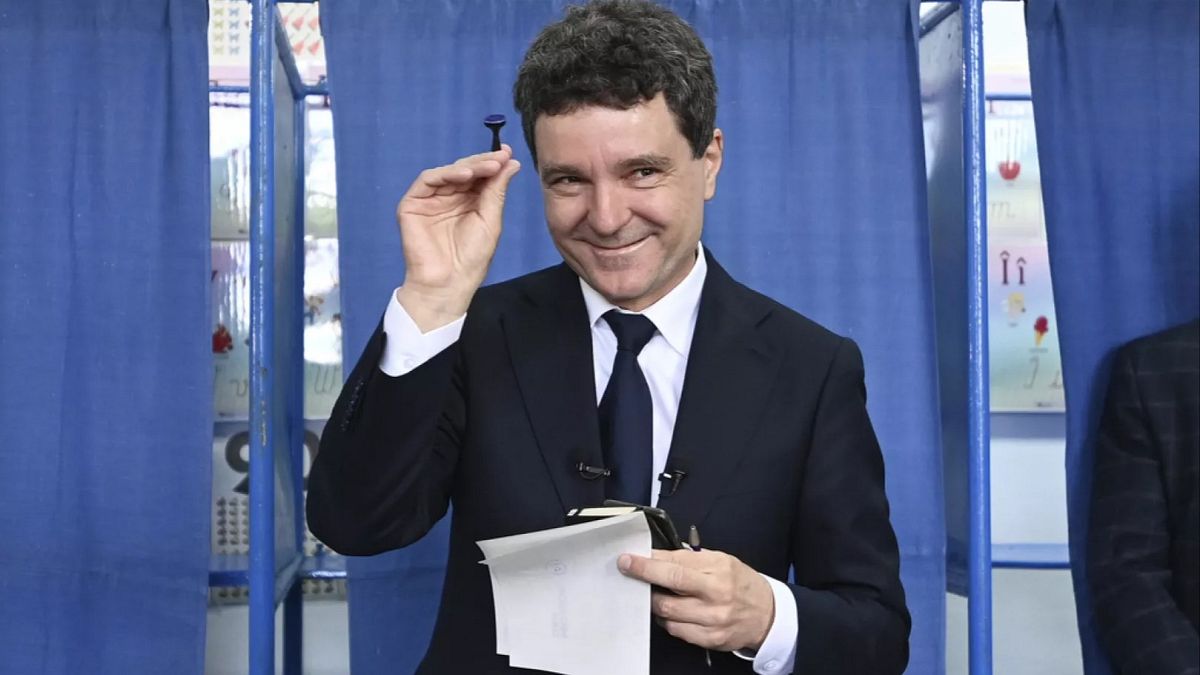European leaders have been quick to congratulate centrist Nicusor Dan on Sunday’s dramatic victory in Romania’s presidential election over his hard-right rival George Simion.
Dan won 53.6% of the vote, ahead of Simion, who during the campaign portrayed his movement as championing nationalist values and conservative policies similar to those of US President Donald Trump.
By contrast, Dan — the pro-EU and pro-NATO mayor of Bucharest — had vowed to keep the nation in the European mainstream and maintain support for neighbouring Ukraine. His win is a huge relief for the EU and Ukraine at a time of crucial challenges for Europe.
European Commission President Ursula von der Leyen offered support to build “an open and prosperous Romania in a strong Europe”. EU Council President Antonio Costa said the result showed “a strong signal of Romanians’ attachment to the European project”.
Jean-Michel De Waele, a political scientist at the ULB University in Brussels, told Euronews that only time will tell if this proves a setback for European nationalists, but stressed that leaders cannot ignore the anger of the anti-establishment voters.
“There are many problems to be solved. And the citizens of the European Union in this part (of Europe) are not convinced by the EU,” he said.
“After all, 46% of Romanian citizens voted for Simion. So the EU can rejoice, but it must not forget and must not say: ‘We understood the message, we will change the communication. Business as usual’.”
Concrete policies and strong positions
Parallel to Romania, Poland and Portugal went to the polls on what turned out to be the European elections’ Super Sunday.
In Poland, pro-European candidate Rafał Trzaskowski won the first round, ahead of conservative Karol Nawrocki. The pair will face each other in a runoff on 1 June.
In Portugal, the ruling centre-right AD alliance won snap parliamentary elections yet fell short of a majority, while the far-right Chega made record gains. Meanwhile, the left-leaning PS lost 20 seats in parliament, resulting in the resignation of party leader Pedro Nuno Santo.
The traditional left-wing parties were in free fall in all three elections. De Waele said that in Romania, the centre-left’s lack of support for the pro-EU candidate was a major surprise.
“There is an identity crisis in Europe and the left-wing parties don’t have much to offer and don’t question themselves much”, De Waele explained.
“The Romanian PSD is a member of the Party of European Socialists, which supports democracy, but that is completely insufficient. So I think it shows a lack of direction, a lack of leadership,” he added.
In the first round of the Polish presidential elections, two right-wing candidates faced each other without a leftist contender.
According to De Waele, the struggles of the left-of-centre parties in Romania, Poland and Portugal revolve around losing touch with their traditional voters.
“We see this clearly in Portugal. The areas where the Portuguese Communist Party or the left was strong are being eaten up by the far right,” De Waele said. “So, they have lost contact with the public, they don’t have much to offer in terms of discourse, as a dream, as a social project. And they are in very, very great difficulty.”
Lately, German and Hungarian social Democrats have struggled to win over voters against their right-wing or centre-right rivals. This is partly because of a leadership issue, according to De Waele.
“I think we need strong leaders who actually dare to take action. You know, being on the left today is almost a bit shameful. It’s as if there were no longer any pride, as if there were no longer a project, as if social democracy had lost its project.”
De Waele believes that the crisis of leadership is one cause of the turn many voters towards action-oriented leaders.
“I think citizens are demanding concrete policies, and governments are taking strong positions. That’s also why … Trump is so successful. He’s this kind of very virile, very strong populist leader.”
“Part of their victory comes from the fact that they say I’m going to do something for you. And I think that, unfortunately, the moderate left or the moderate right are paralysed and don’t have any strong proposals,” De Waele concluded.

